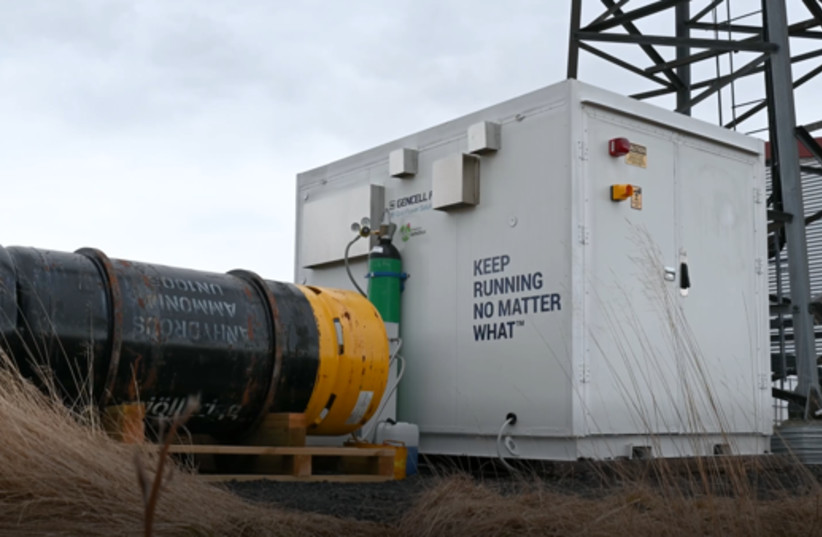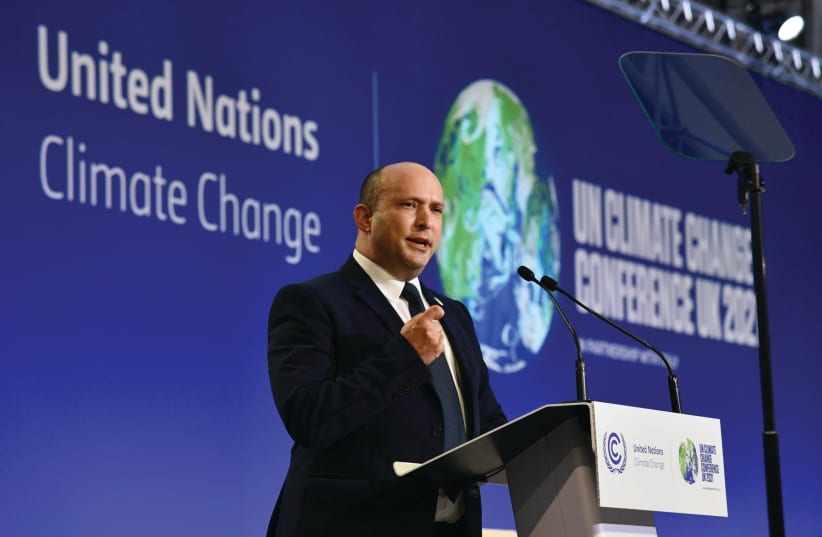At the COP26 climate change conference in Glasgow last year, Prime Minister Naftali Bennett made the declarations that Israel would become the “Climate Innovation Nation.” Two months later, there are several companies that are pushing Israel towards that identity, with innovative approaches to food, waste and energy production.
One of the major contributors to climate change is the livestock industry.
“About 14% of global carbon emissions come from the [livestock] industry,” said Tomer Aizen, CEO of Wilk, a food-tech company that uses cell extraction and biotechnology to create a milk alternative that contains a one-to-one reproduction of the components found in milk from any animal.
According to the Food and Agriculture Organization of the United Nations, at least two-thirds of that percentage can be attributed specifically to cows, whose milk requires a lot of intake for little output. As Aizen explained, “In order to produce one liter of milk, it requires around 1,000 liters of water.”
Aizen said that by means of Wilk’s technological innovation, the need for livestock to contribute to the dairy industry will be a moot point.
“We won’t need the actual animals to produce milk. Once you don’t need the cow, more immediate solutions will occur. Gas emissions will drop dramatically, and the amount of water that you need to water the cows’ food will be greatly reduced.”


Wilk CMO Rachelle Neumann added, “When we’re talking about sustainability, we’re not only talking about the climate; we’re going to make nutritional food available throughout time.” She explained that the decreased emphasis on livestock won’t only mean fewer emissions, but also an increased ability to scale food production.
“If you don’t produce food in a sustainable manner, it won’t always be producible.”
Another angle of the move to sustainability is waste processing, recovery, and inevitably, storage. While some countries have worked hard to renovate the way they handle garbage (such as Switzerland, Sweden and Denmark, all of which have 99% or more waste recovery, according to research conducted by packaging supplier RAJA), Israel is lagging behind.
“In the past 20 years, we haven’t changed, even a bit, the amount of landfilling in Israel,” said Dan Levin, founder of Advanced Sustainable Technologies (AST). “The amount of waste that we produce next year will be more than the landfill space that we have throughout the country. So basically we have two options: Wait for it to overflow, and send it to landfills in other countries, or build a wall around the landfill and basically start piling up the waste into mountains.”
Currently, he said, Israel is planning on the latter.
“We’re just postponing the end. We need to build infrastructure to divert the waste from the landfill right now.”
ACCORDING TO Levin, even efforts to recycle are falling short of solving the issue. Not all materials can be recycled, so a lot of trash ends up in the country’s landfills.
His company presents a solution to the dilemma. AST uses treatment technology that converts waste into electricity by super-heating the trash without burning it, instantly converting any organic waste into gas that can be cleaned and used for energy production. They also avoid CO2 production completely by converting it into natural gas. The remaining materials can be further separated into recyclables (mostly metal), and the final resulting lump of plasma (now a fraction of the original mass’s size) can be used as a building material.
The team is currently focused on hazardous materials, but Levin says their process can take any type of waste. If the proper infrastructure is put into place, his technology can reduce the nation’s landfill mass by up to 95%.
“Waste to energy is basically the final solution,” Levin said
Producing clean energy is a definitive lynchpin in the reduction of carbon emissions; but once you create the energy, you need to be able to store it. Gencell Energy does both, utilizing zero-emission alkaline fuel cells to store the energy it produces by converting ammonia into electricity.
Gencell CEO Rami Reshef believes the Start-Up Nation could do better to promote clean energy.
“We are lagging behind,” he said. “Israel takes action only under the threat of potential catastrophe; 100% of the water we’re drinking right now is the result of desalination.” He noted that the technology used to produce Israel’s potable water supply was invested in only once Israel was faced with a severe water shortage.
In addition, he explained, regulators are sluggish in moving to promote green technology.
“Israel, so far, has not presented the right flexibility to entrepreneurs. It hasn’t given them a backyard to use as a test lab in order to produce and test new technologies. Regulators here aren’t helping companies like Gencell to be successful.”
That said, Israel’s Energy Ministry is doing what it can to pick up the pace.
“We are pushing forward renewable energy as quickly as we can,” Gideon Friedmann, acting chief scientist at the Energy Ministry, told The Jerusalem Post in December. “Our new target for renewable energy is 20% by 2025, and 30% by 2030. We know that to reach high penetration of renewable energy in Israel we need to install significant amounts of storage.”
Another such clean energy production and storage company, Brenmiller Energy, utilizes thermal technology by using crushed compacted rock as the medium to store high-temperature heat. That heat can later be converted to produce heat or electricity when required. The company’s chief business officer, Doron Brenmiller, echoed Reshef’s point that Israel hasn’t allowed clean energy companies enough room to fully implement their solutions.
“In order for Israel to become a leader [in the realm of climate solutions], we need to commit to implementing [climate technology and infrastructure] at full-scale,” Brenmiller said. “We need to really push the pedal to the floor to make it happen.”

